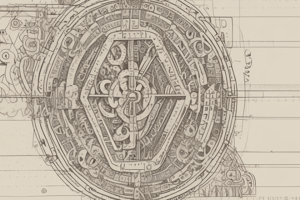Podcast
Questions and Answers
What was the historical order of development for alphabets discussed in the text?
What was the historical order of development for alphabets discussed in the text?
Which ancient alphabet was the foundation for the Latin alphabet?
Which ancient alphabet was the foundation for the Latin alphabet?
How many vowels are included in the Latin alphabet?
How many vowels are included in the Latin alphabet?
Which alphabet system played a significant role in spreading Christianity among Slavic peoples?
Which alphabet system played a significant role in spreading Christianity among Slavic peoples?
Signup and view all the answers
What was the primary purpose of Cyril and Methodius in creating the Cyrillic alphabet?
What was the primary purpose of Cyril and Methodius in creating the Cyrillic alphabet?
Signup and view all the answers
In what countries is the Cyrillic alphabet primarily used?
In what countries is the Cyrillic alphabet primarily used?
Signup and view all the answers
Why is alphabetical order considered crucial in written communication?
Why is alphabetical order considered crucial in written communication?
Signup and view all the answers
What practical application demonstrates the use of alphabetical order?
What practical application demonstrates the use of alphabetical order?
Signup and view all the answers
What makes implementing alphabetical order complex in some situations?
What makes implementing alphabetical order complex in some situations?
Signup and view all the answers
How does understanding alphabetical order contribute to effective communication?
How does understanding alphabetical order contribute to effective communication?
Signup and view all the answers
Study Notes
Alphabets
Alphabets are sets of letters used to represent sounds and create words within various languages. While this concept is often associated with English, there are many other alphabet systems used around the world. Let's delve into the intricacies of alphabets by examining their historical development and the importance of alphabetical order.
Historical Development of Alphabets
The first known writing system was developed approximately 5,000 years ago in Mesopotamia using cuneiform. This was replaced by the Phoenician alphabet, which was one of the earliest examples of an alphabetic script. Over time, these alphabet systems evolved and spread across the Mediterranean region and beyond, leading to the creation of numerous alphabets used today.
Greek Alphabet
One of the most influential alphabets was the Greek alphabet, which developed from the Phoenician script. It was adopted by the Etruscans before being modified further by the Romans, who added three more letters to form what is now known as the Latin alphabet. This alphabet, which became the basis for modern European alphabets, includes 26 letters - 21 consonants and five vowels.
Cyrillic Alphabet
Another significant contribution came from the Cyrillic alphabet, which was developed by two brothers, Cyril and Methodius, in the late ninth century AD. They created this alphabet to help spread Christianity among the Slavic peoples of eastern Europe. Today, the Cyrillic alphabet is used primarily in Russia, Ukraine, Belarus, and some other countries.
Importance of Alphabetical Order
In any written communication, it is crucial to organize information in a logical manner. Alphabetical order is a common method used to achieve this. By arranging items or data according to their alphabetical sequence, we can easily access and locate specific entries without having to manually search through each item individually.
Practical Applications of Alphabetical Order
There are several practical applications where alphabetical order plays a vital role. For instance, phonebooks list contacts alphabetically to quickly find someone's number. Similarly, libraries categorize books under various sections based on authors' last names, allowing readers to locate novels effortlessly. In databases and software engineering, sorting fields in alphabetical order helps retrieve records efficiently.
Complexity Factors in Alphabetical Order Systems
While alphabetical order may seem straightforward, its implementation becomes more complex when dealing with non-Latin scripts or multi-language scenarios. These challenges require customized solutions tailored to individual communities and their linguistic needs. For example, Arabic scripts are read from right to left, so an alphabetical order system would need to take this directionality into account.
In conclusion, understanding how alphabets have evolved over thousands of years and their role in facilitating effective communication has made them essential tools for human society. Furthermore, mastering alphabetical order allows us to better navigate our daily lives, making sense of vast amounts of information and organizing it effectively.
Studying That Suits You
Use AI to generate personalized quizzes and flashcards to suit your learning preferences.
Description
Explore the historical development of alphabets from ancient Mesopotamia to modern scripts like the Latin and Cyrillic alphabets. Understand the significance of alphabetical order in organizing information efficiently across various fields.




